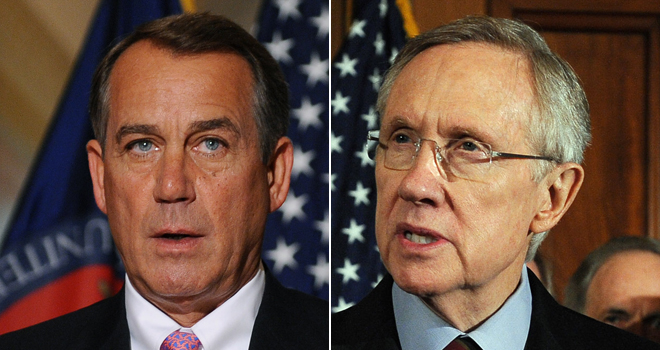Speaker John Boehner (R-OH) recovered Friday after a set of bruising setbacks this week, but his real test will come over the weekend when he’s forced to quickly negotiate a bill that will attract enough Democratic support to offset the inevitable GOP losses on his right flank while not alienating his base of support and losing too many Republicans — all under incredibly tight time pressure as the August 2nd default deadline looms ever larger.
Just how he threads the needle will be the most difficult test of his leadership yet.
Most House Republicans will not swallow Senate Majority Leader Harry Reid’s (D-NV) proposal without some significant changes. Their biggest problem with the bill is its raising of the debt ceiling that carries the country into 2013 without a vote. Setting that aside, both proposals are actually very similar in that they don’t include any revenues or tax increases and would produce roughly $1 trillion over the next decade with a plan for $1.5 trillion more in cuts hashed out by a bipartisan debt committee.
Republicans, however, are already complaining about the lack of a two-step process in the Reid plan, refusing to grant Democrats and President Obama “a blank check” through the 2012 elections.
“I’d rather do a two-step process,” said Rep. Tom Cole (R-OK), a senior Republican who formerly ran the House Republicans re-election arm. “Nobody here is going to give Harry Reid and Obama a blank check.”
After the House acts Friday night and votes on the Boehner bill, Rep. Jeff Flake (R-AZ), who is running for Senate in Arizona and held out support for the Boehner bill until a balanced budget component was added Friday, said the onus is now on the Senate to find a path forward that that attracts enough Republicans in the House to be viable.
“All we can do is pass legislation here and hope that the Senate follows — and provides a little ping to our pong,” he said Friday afternoon.
Cole, a veteran politician familiar with the last-minute twists and turns involved in important negotiations, said it’s common knowledge that the Speaker has to carry at least a majority of his party in any compromise he forces with Democrats.
“Any Speaker would need to get a majority of his conference [to vote in favor of the deal],” Cole said. “If the people you are negotiating with don’t believe that, then they aren’t serious about getting a plan.”
In the next 48 to 72 hours Boehner and Reid will be engaged in a complex balancing act to find the 60 votes in the Senate and the 216 votes needed to ensure passage. And each side will have to be willing to alienate their usual allies–but not enough to cause to big a chunk of them to bolt. The result will likely create some very strange bedfellows.
Now that the political exercise of passing the Boehner bill is over, the White House is urging Boehner to use the Reid plan as the basis for a compromise.
“[the Reid proposal] not only achieves more deficit reduction than the bill passed in the House today and puts a process in place to achieve even more savings, it also removes the uncertainty surrounding the risk of default,” White House spokesman Jay Carney said in a statement Friday evening. “The President urges Democrats and Republicans in the Senate to find common ground on a plan that can get support from both parties in the House – a plan the President can sign by Tuesday.”
Yet, already, on the Democratic side, 30 or more members of the Congressional Black Caucus are lining up alongside Tea Party Republicans in opposition to the Reid plan — albeit for very different reasons. The CBC members and other progressives say massive cuts to programs for the poor resulted from the tax break for millionaires allowed when Congress extended the Bush tax cut.
More senior members of the GOP conference say they are confident in Boehner’s abilities to negotiate behind closed doors.
“You trust your negotiator or you don’t trust your negotiator — and I trust John Boehner,” Cole said.
Rep. Mike Simpson (R-ID), a ten-year veteran of the House said most of the conference doesn’t blame Boehner for having to delay the vote a day — even though he was forced to do so while the House of Representatives was under intense media scrutiny. In their view, he was simply responding to the political will of his conference who were elected on pledges to cut Washington spending.
“The people who are opposed to it are opposed to it on principle,” Simpson said. “I think he’s done a masterful job trying to find a way forward. To the extent that this is a blemish on Boehner, it’s a blemish on the entire Congress.”
The hard part in politics, Simpson said, is knowing when you’ve won and when to stop asking for more.
“Just like in painting, the hardest thing for an artist to learn is when to stop painting–because there are always imperfections,” Simpson, a part-time artist, told TPM. “But if you don’t stop applying paint, it just turns into a big mess.”









